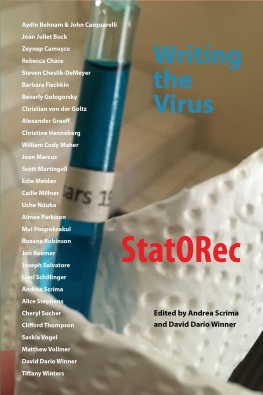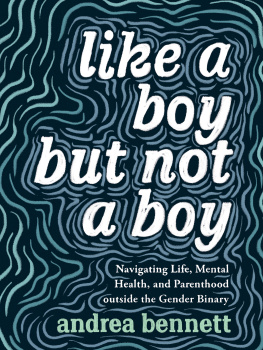Andrea Scrima - Writing the Virus
Here you can read online Andrea Scrima - Writing the Virus full text of the book (entire story) in english for free. Download pdf and epub, get meaning, cover and reviews about this ebook. year: 2020, publisher: Outpost19, genre: Art. Description of the work, (preface) as well as reviews are available. Best literature library LitArk.com created for fans of good reading and offers a wide selection of genres:
Romance novel
Science fiction
Adventure
Detective
Science
History
Home and family
Prose
Art
Politics
Computer
Non-fiction
Religion
Business
Children
Humor
Choose a favorite category and find really read worthwhile books. Enjoy immersion in the world of imagination, feel the emotions of the characters or learn something new for yourself, make an fascinating discovery.
- Book:Writing the Virus
- Author:
- Publisher:Outpost19
- Genre:
- Year:2020
- Rating:3 / 5
- Favourites:Add to favourites
- Your mark:
- 60
- 1
- 2
- 3
- 4
- 5
Writing the Virus: summary, description and annotation
We offer to read an annotation, description, summary or preface (depends on what the author of the book "Writing the Virus" wrote himself). If you haven't found the necessary information about the book — write in the comments, we will try to find it.
Writing the Virus — read online for free the complete book (whole text) full work
Below is the text of the book, divided by pages. System saving the place of the last page read, allows you to conveniently read the book "Writing the Virus" online for free, without having to search again every time where you left off. Put a bookmark, and you can go to the page where you finished reading at any time.
Font size:
Interval:
Bookmark:
Outpost19
San Francisco
outpost19.com
Copyright 2020 by Andrea Scrima and David Dario Winner
Published 2020 by Outpost19
All rights reserved.
ISBN 978-1-944853-77-8 (pbk)
ISBN 978-1-944853-78-5 (ebk)
INTRODUCTION
Andrea Scrima
Covid affects people in vastly different ways; it affects nations in vastly different ways. The pandemic seems to have brought every countrys worst nightmare back to life. In the United States, the racially motivated violence weve witnessed recently on the part of the police and of white supremacists feels like a resurgence of our original sin, of whatever allowed us to found a nation based on slave labor, while Germany, known for its rational leadership and admired as a shining example of a fully functioning democracy, is currently seeing a reemergence of the dark fanaticism of its fascist past. A volatile mix of the radical right and esoteric-minded, of Coronavirus deniers, conspiracy theorists, Reichsbrger, neo-Nazis, and anti-vaxxers are calling on protestors to storm Berlinspurred on by a group that goes by the name Querdenker 711 (Lateral Thinkers 711) and calls for the immediate overthrow of the German government and imprisonment of Angela Merkel; the far-right political party Alternative for Germany (AfD), which is exploiting the opportunity to maneuver the movement to its own ends; and other right-wing influencers who see the public health measures as an attack on their personal freedom. Earlier this week, the citys interior minister banned the demonstration, citing grievous infractions of public safety regulations during the first anti-Corona protest on August 1, which deliberately defied mask-wearing and social distancing requirements, conflating them with a nefarious plan on the part of the state to strip its citizens of their basic rights. But at 3 a.m. this morning, the administrative appeals court of Berlin-Brandenburg lifted the ban, and while many have expressed dismay at the prospect of another super-spreader event in the capital, the takeaway is that banning the protest and citizens right to freedom of assembly will only serve to fuel the movements supporters. And so, the anti-Corona rally, which is expected to attract more than 20,000 demonstrators from all over the country, will go ahead as planned. With one difference: this time around, calls for violence have been spreading through social media, with far-right supporters advising people to come armed and ready to fight.
Are American Coronavirus deniers comparable to their German counterparts? In Europe, as in the United States and elsewhere, denying the existence of a global pandemic and defying basic measures to contain it can seem like a kamikaze mission, a form of collective insanity. Do they really believe that Bill Gates is conniving with other Illuminati to install a pharma-dictated technocracy to exert mind-control through a legally mandated vaccine? Surely theres another explanation, another set of doubts and grievances fueling the movement. Germany has seen a resurgence of the highly charged phrase Lgenpressethe lying press, an older, German version of fake news that originated during WWI to counter enemy propaganda and that infamously resurfaced during the Nazi era and again later, as a reactionary anti-immigrant movement rose up in Germany in 2014. We live in volatile times on both sides of the Atlantic; large parts of the population are becoming more polarized than ever before. And yet a dangerous divide has opened up between the measures mandated to contain contagionthe closure of schools, universities, daycare centers, and almost everything else that enables us to live the lives weve known until nowand the ruination of livelihoods and abrupt rise in bankruptcies, foreclosures, homelessness, mental illness, and domestic abuse. Some of the restrictions can seem unfair, while the official reasoning offered to justify them comes across as inconsistent at best. In Germany, theaters and cinemas are allowed to open at reduced capacity and under strict distancing measures, while airlines, evidently the more powerful lobby, continue to pack passengers into every available seat. The restrictions seem at least partly based on economic dictatesculture is clearly less important than the aviation industry or the automobile industry. So are we being lied to?
In the first days of lockdown, a solemn mood prevailed as we watched health workers battle an invisible enemy under inconceivable conditions. Overwhelmed by the sick and dying and forced to adopt triage measures otherwise implemented during wartime to distribute a limited number of ventilators to a far greater number of patients in dire need of them, we wept with doctors and nurses online, their faces bruised by countless hours of wearing PPE, as they described the unbearable reality they were facing. As a new sense of solidarity took hold, we adhered to lockdown and quarantine, we scrubbed our hands and applauded essential workers every evening from our windows and balconies. And as anxiety gave way to an appreciation for the respite the virus was offering some of us, a temporary pause in the ever-accelerating speed of modern life, a new feeling emerged: that the viruss appearance, in spite of all its perils and in spite of all the sacrifices required of us, harbored unprecedented potential. Some said that nature was telling us to slow down; that nature was giving humanity a chance to wake up and finally comprehend the urgent need for change. As the first lockdowns were eased, we watched citizens of countries with large tourism industries retake their streets, and in spite of the economic blow dealt to so many, the images of children playing in piazzas normally packed with foreign crowds seemed, at least to those of us enjoying the comparable luxury of home office, to carry a promise of some kind: a return to a more sane and humane way of living. This state of grace was short-lived, of course; the loss of livelihoods and the collapse of entire economic sectors would soon accelerate a backlash during the course of which a degree of risk and potential contagion would become normalized. Human lives are not, as were frequently told, merely lost to a dangerous virus, but to broken economies and financial ruin.
But its hard to ignore the feeling of a lost chance. After years of watching the worlds governments fail to work together to bring about the necessary transition from carbon fuel to green energy alternatives; after scientific studies repeatedly revealed that reducing carbon emissions at such a late stage would at best alleviate only a small part of the inevitable devastating effects of global warming, but that this was far preferable to doing nothing and unleashing the worst-case scenario on the worlds most vulnerable communities; after watching politicians offer lip service at climate conferences as the status quo remained largely unchangedsuddenly, everything seemed possible after all: industrialized countries were, indeed, rich enough to subsidize entire sections of the population as the skies turned a blue we hadnt seen since the eruption of Eyjafjallajkull, which ten years ago had also brought international air travel to a standstill. It turns out that we can, in fact, reduce emissions; we can, in fact, slow down production. Why was the virus able to achieve this, while the prospect of an uninhabitable planet was not?
Font size:
Interval:
Bookmark:
Similar books «Writing the Virus»
Look at similar books to Writing the Virus. We have selected literature similar in name and meaning in the hope of providing readers with more options to find new, interesting, not yet read works.
Discussion, reviews of the book Writing the Virus and just readers' own opinions. Leave your comments, write what you think about the work, its meaning or the main characters. Specify what exactly you liked and what you didn't like, and why you think so.












